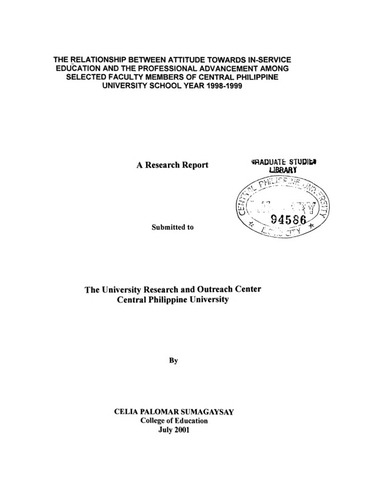The relationship between attitude towards in-service education and the professional advancement among selected faculty members of Central Philippine University school year 1998-1999
| dc.contributor.author | Sumagaysay, Celia P. | |
| dc.date.accessioned | 2021-05-27T06:39:07Z | |
| dc.date.available | 2021-05-27T06:39:07Z | |
| dc.date.issued | 2001-07 | |
| dc.identifier.citation | Sumagaysay, C. P. (2001). The relationship between attitude towards in-service education and the professional advancement among selected faculty members of Central Philippine University school year 1998-1999 (Research report). Jaro, Iloilo City: University Research Center, Central Philippine University. | en_US |
| dc.identifier.uri | https://hdl.handle.net/20.500.12852/904 | |
| dc.description | Abstract only | en_US |
| dc.description.abstract | This study aimed to determine the relationship between attitude towards in¬ service education and the professional advancement among selected faculty members of Central Philippine University, school year 1998-1999. More specifically, this study aimed to determine the characteristics of faculty members in terms of the following variables: a) age, b) sex, c) civil status, d) educational attainment and e) family income; determine the respondents attitude towards in-service education and their professional advancement. This study also aimed to determine the relationship between the respondents’ attitude towards in-service education and their professional advancement and the respondents’ attitude towards in-service education and their selected personal characteristics. The study was conducted among 122 selected full-time faculty members of Central Philippine University as its study population. The sample respondents were drawn using random sampling by means of lottery. The main instrument used in this study was a 19-item questionnaire about certain attitudes on in-service training and the respondents’ professional advancement. For statistical tools, percentages were used to draw a profile of the respondents. In ascertaining the degree of relationship between variables, Cramer’s V was used. The results of the study revealed that majority of the respondents had favorable attitude towards in-service training, always attend faculty meetings, lectures, seminars and conferences. Other respondents attend these in-service trainings sometimes and a few never attend at all. For formal schooling, a bigger proportion of respondents were enrolled in the Graduate School. When the relational analysis between attitude and professional advancement was utilized, the analysis showed that attitude of teachers towards in-service training was not significantly related in any of the three areas on professional advancement; namely: a) membership in professional organization, b) attendance in faculty meetings, lectures, conferences, seminars and workshops, c) formal schooling. When the relationship between attitude and personal characteristics was analyzed it revealed that except on sex, all the other variables such as age, civil status, educational attainment and family income were not significantly related with altitude towards in¬ service training. In the light of the findings of this study, the following conclusions were drawn regarding the profile of the respondents, their attitude towards in-service education and their professional advancement. Majority of the respondents were female, married and were in their early forties. A bigger proportion were enrolled in the Masteral Program and were receiving a gross family income of Pl6, 001 and up. A bigger percentage of the respondents had favorable attitude towards in-service education. However, there were few who were quite uncertain as to their attitude. Results of the data on professional advancement had shown that majority of the respondents became members of a professional organization, although there were few who did not join at all. Active members were more in number than inactive members. A higher percentage of these active members joined one or two organizations while a few members had joined three or four organizations. Results of correlation between variables revealed that faculty member’s attitude towards in-service training and professional advancement were not significantly related to each other. The data further revealed that the respondents’ characteristics such as age, civil status, family income and educational attainment did not have any bearing on the respondent’s attitude towards in-service education. However, sex as one of the variables had a significant relationship on the teacher’s attitude towards in-service education. The findings had shown that majority of the female teachers had favorable attitude towards in-service education than their male counterparts. | en_US |
| dc.format.extent | xi, 61 leaves | en_US |
| dc.language.iso | en | en_US |
| dc.publisher | Central Philippine University | en_US |
| dc.subject.ddc | GSL 378.242 Su61 | en_US |
| dc.subject.lcsh | Central Philippine University | en_US |
| dc.subject.lcsh | Central Philippine University--Faculty | en_US |
| dc.subject.lcsh | Teachers | en_US |
| dc.subject.lcsh | Continuing education | en_US |
| dc.subject.lcsh | Teachers--Training of | en_US |
| dc.subject.lcsh | Teachers--Attitudes | en_US |
| dc.subject.lcsh | Teachers--In-service training | en_US |
| dc.subject.lcsh | Career development | en_US |
| dc.subject.lcsh | Central Philippine University--Faculty--In-service training | en_US |
| dc.title | The relationship between attitude towards in-service education and the professional advancement among selected faculty members of Central Philippine University school year 1998-1999 | en_US |
| dc.type | Technical Report | en_US |
| dcterms.accessRights | Limited public access | en_US |
| dc.description.bibliographicalreferences | Includes bibliographical references | en_US |
| local.relation.associatedcontent | https://repository.cpu.edu.ph/handle/20.500.12852/612 Full paper published in Patubas | en_US |
Fichier(s) constituant ce document
Ce document figure dans la(les) collection(s) suivante(s)
-
Research reports [167]
-
Research reports [10]


